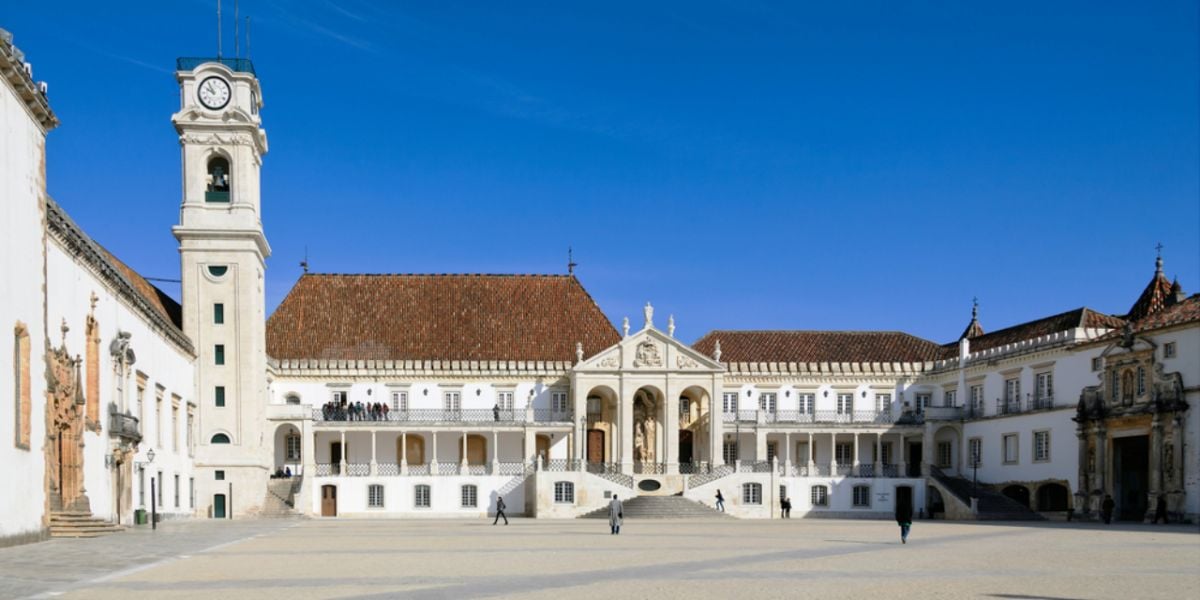
Portugal attracts thousands of foreign students every year! If you're one of the lucky students making their way to Portugal over the next school year, then here's an overview of the higher education system in the country.
The Portuguese higher education system
Just like most other European countries, Portugal has both public and private universities. Within the public sector, students can apply to Universities or Polytechnic Institutions. While the former focuses on scientific and cultural knowledge, the polytechnic degrees lean more towards applied sciences and vocational work. For example, if you want to study medicine, law, economy or engineering, you'll have to apply to a university. On the other hand, Polytechnic Institutions teach things like hotel management, nursing, accounting or business communication. A lot of the time, though, degrees actually overlap, and you can find degrees in education, physical therapy, marketing or design (among many others) in both universities or polytechnic institutions. Some degrees also require a short internship during the cycle's final semester.
Higher studies in Portugal can result in the following degrees:
- Licenciatura - This is a bachelor's degree, which is completed over 3 years.
- Mestrado - This is a master's degree and is earned after completion of the Licenciatura. It requires another 2 years of postgraduate study. Some Licenciaturas already include the master's, taking a total of 5 years to complete.
- Doutoramento - This is a doctorate degree or PhD. It requires you to write an original thesis and to defend it in front of an academic audience, and is the highest level of degree.
Both systems of higher education grant students a bachelor's degree after a 3-year cycle of studies, after which you can apply to a Master's Degree. For people studying in universities, some degrees won't let you opt out of the Master's Degree, meaning it effectively takes 5 years to successfully get out of college. On the other hand, it is not possible to get a PhD in a polytechnic institution, as these are only available in universities.
The Portuguese academic year generally runs from September to June and is broken into two semesters. Classes are usually also offered over the summer and winter holiday breaks. Undergraduate classes are taught almost exclusively in Portuguese, while postgraduate degrees may offer more English-speaking classes. You may require Portuguese language classes before commencing your studies if you aren't already fluent.
The leading universities in Portugal
Though not as coveted as world-renowned universities found in the US and the UK, the Portuguese higher education system still boasts some popular and well-placed institutions, including one of the oldest universities in Europe — the University of Coimbra. Other top universities include the Universidade of Aveiro and the Universities of Algarve, Lisbon, Porto, Minho, and the Catholic University of Portugal. According to the famous and reputed 2025 Shanghai Ranking, Portugal boasts six universities ranked among the 1000 best in the world: Universidade de Lisboa, Universidade do Porto (both top 300), Universidade de Aveiro (top 500), Universidade de Coimbra, Universidade do Minho (both top 600) and Universidade Nova de Lisboa (top 800).
However, if you're completing a specific degree and are looking for the best Portuguese university in that area, a more detailed analysis is required. According to the Financial Times, Nova School of Business and Economics, Católica Lisbon School of Business and Economics, ISCTE (Superior Institute for the Sciences of Labor and Enterprises), FEP (Faculty of Economy of Porto) and the Lisbon School of Economics and Management are the best colleges in Portugal for economics, business management and finance students, featuring among the 100 top business schools in Europe in 2024. On the other hand, the universities of Coimbra, Porto and Lisbon are the best in the country for students of architecture, chemistry, engineering, computer science and medicine, according to THE rankings.
Naturally, universities in Lisbon and Porto often top national rankings, as all the best and most celebrated professionals teach there. On the downside, the cost of living is much higher compared to the rest of the country, as renting a single bedroom in a shared house/apartment will easily set you back between 450€ and 500€. Furthermore, other expenses such as groceries, eating out and leisure activities are more expensive the country's two bigger cities (especially in Lisbon).
How to apply to a university in Portugal
The application process for public universities in Portugal depends on the cycle of studies you are seeking to complete. Undergraduates must register on the DGES website (Higher Education Administration, in English) to be able to apply, listing 6 different public institutions in order of preference. On the other hand, graduates and postgraduates must apply directly on the website of their university of choice. In both cases, applicants will be asked for official translations of their school records and/or final exams (such as the SAT in the USA, the A-Levels in the UK or the BAC - Baccalauréat in France), which must also be recognized at the Portuguese Embassy in their country of residence.
As for private universities in Portugal, the entire application process is managed directly by the institution. This means you should contact the university beforehand and ask about the application requirements and any additional information that can be useful to candidates.
Plus, if you are not a part of the Erasmus program (non-EU citizen/resident) nor any other student transfer protocol and wish to apply for a Portuguese university, bear in mind you will need to complete admission exams. These take place every year between May and July and are used as a ranking for entry to the university. If you're not living in Portugal, you can request to take these exams at the Portuguese Embassy in your country of origin or reach out directly to the university you're seeking to attend and enquire about the admission exams and how to take them.
Finally, the application process for international students is usually split into three different stages (January-February, June-July and August-September), with minimum grade requirements changing for each one of them. Usually, vacancies get smaller and smaller with each passing deadline, so it will be technically easier to get in if you do it during the first stage. Furthermore, by applying during the first stage, you will have plenty of time (classes start in September) to sort out your visa and accommodation arrangements. On the other hand, if you already live in the country and are going to apply through the “local route” (after taking the admission exams), applications take place in July and August.
However, different institutions can bear different deadlines for their application process (especially in private universities), so always make sure to stay in touch with a representative of your preferred higher education institution so that you don't miss your opportunity. After applying, you will receive feedback from the university within one/two months of the deadline.
Documents needed for applying to a university in Portugal
Should your course be taught in English, you will need a proficiency test like IELTS or TOEFL. If your degree is exclusively taught in Portuguese, as an international student, you might need a proficiency certificate as well. Other documents can include transcripts of academic records, motivation letters, proof of payment of application fee and portfolio. Documents are usually required to be presented in English (plus the original language).
Needless to say, your official passport will be needed, as well as a valid student visa (depending on nationality and length of stay).
How to get a student visa to study in Portugal
If you're an EU citizen (plus Switzerland, Iceland, Liechtenstein and Norway) you do not need to apply for a student visa in Portugal. In fact, if staying for less than 3 months, you don't have to worry about any bureaucratic requirements. However, should your cycle of studies in the country last longer than the aforementioned 3 months, it is mandatory to register your stay with local authorities. To get a registration certificate, students will need to apply at their local council within 30 days after completing three months of arriving in Portugal. This certificate costs 15€ and is valid for the entire stay of the student in the country, being issued immediately upon request. To complete the application, candidates need to present a valid ID document, a written affidavit declaring that they are enrolled in an officially recognized school in the country, proof of financial subsistence and proof of health insurance (only if your country requires the same for Portuguese students).
On the other hand, if you come from outside the EU/EEA, you'll probably need a student visa. The only exception applies to citizens who are staying for less than 3 months AND come from one of the 63 visa-exempt countries, such as the US, the UK, Canada or Japan. Nonetheless, students from countries that require a Schengen visa or are planning to stay longer than 90 days (regardless of nationality) will have to apply for a student visa. To do so, you will need to get a letter of acceptance from the university you wish to enroll in and get in touch with the Portuguese Embassy in your country of residence. After scheduling your interview at the embassy, you'll fill out the application form, submit all the required documentation in person and pay the 90€ visa fee. Once you get a positive response and the magic sticker on your passport (it might take up to 3 months – worst-case scenario), you can take care of travel arrangements.
Keep in mind that the student visa is only valid for 3 months, which is why you will also need to obtain a residence permit if you're staying longer than 90 days. After your visa expires, this permit will allow you to remain in the country legally. In order to do so, you'll have to book an appointment at your nearest AIMA office. The Agência para a Integração, Migrações e Asilo (AIMA) was created in late 2023 as the entity responsible for managing migration processes in Portugal. Non-EU residents will need to apply for a student-based residence permit (called a D4 visa) in their home countries via a Portuguese consulate or embassy. Depending on the instructions provided by the consulate/embassy, applications may also be submitted in the e-visa portal or through third-party VFS Global.
Tuition fees in Portugal
As one might expect, public universities are generally slightly cheaper than private ones for international students. Generally, undergraduate courses range from 3,000€ to 7,000€ per year, while graduate and post-graduate courses range from 1,200€ to 2,500€, depending on the degree and the university. However, if you're an EU citizen, you'll be paying the exact same public fees as Portuguese students, which are currently capped at 697€/year.
Needless to say, private universities' tuition fees can go much higher than that. Taking Universidade Católica as an example, annual tuition fees for lower-level degrees currently stand at 7,000€ for international students, though you also need to factor in hundreds upon hundreds of euros in application and registration fees, extra credits and other bureaucratic processes.
How to get a scholarship to study in Portugal
Although definitely not easy, getting a scholarship to study in Portugal is far from impossible. First, it is always a good idea to check local programs for students wishing to study abroad in your country of origin. Considering Portugal is such a small country, not many nations have specific programs catering to Portuguese universities, but you might end up finding broad assistance programs for people wishing to study in the EU. One such example is the Erasmus Mundus Joint Masters program, which attributes scholarships to international graduates to help cover the costs of visa, travel and living expenses. Naturally, there are also other projects for undergraduates.
Speaking of Erasmus, you can always try to rely on funding programs from your local government and/or university. If you're a resident of an EU country, there are usually several scholarship programs run by local authorities to help national students study abroad. The amount of these allowances usually depends on factors such as distances between your country of residence and – in this case – Portugal, the local cost of living and the total income in your household.
Currently, the European Education and Culture Executive Agency runs 6 different funding programs for students until 2027 (Erasmus+, European Solidarity Corps, Creative Europe, Citizens, Equality, Rights and Values, Pilot Projects and Preparatory Actions and Intra-Africa Academic Mobility Scheme), and you can check how to apply directly on their website. On the other hand, you may also check out the European Funding Guide, an online resource where you can literally find thousands of different scholarships and funding programs. Finally, StudyPortals also runs a scholarship program open to international students from all across the globe.
Finally, you can also check out the website of the university you wish to enroll in to confirm whether they run any kind of local program to help out international students. Each university – even the public ones – is free to establish its own programs and admission criteria and can usually be found within the Department of Student Support Services (Serviço de Acção Social).
Needless to say, and regardless of the type of scholarship you wish to apply to, every single grant program usually requires an impeccable record when it comes to grades, attendance and overall student performance and proof of proficiency in English or Portuguese. A detailed and well-written motivation letter, as well as a CV with diverse extra-curricular activities, are also major pluses.
We do our best to provide accurate and up to date information. However, if you have noticed any inaccuracies in this article, please let us know in the comments section below.








